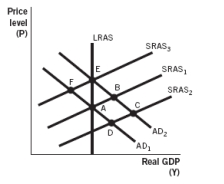Exam 13: The Aggregate Demandaggregate Supply Model
Exam 1: The Five Foundations of Economics101 Questions
Exam 2: Model Building and Gains From Trade149 Questions
Exam 3: The Market at Work: Supply and Demand142 Questions
Exam 4: Price Controls135 Questions
Exam 5: The Efficiency of Markets and the Costs of Taxation152 Questions
Exam 6: Introduction to Macroeconomics and Gross Domestic Product148 Questions
Exam 7: Unemployment146 Questions
Exam 8: The Price Level and Inflation141 Questions
Exam 9: Savings, Interest Rates, and the Market for Loanable Funds139 Questions
Exam 10: Financial Markets and Securities123 Questions
Exam 11: Economic Growth and the Wealth of Nations137 Questions
Exam 12: Growth Theory149 Questions
Exam 13: The Aggregate Demandaggregate Supply Model149 Questions
Exam 14: The Great Recession, the Great Depression, and Great Macroeconomic Debates142 Questions
Exam 15: Federal Budgets: the Tools of Fiscal Policy123 Questions
Exam 16: Fiscal Policy148 Questions
Exam 17: Money and the Federal Reserve147 Questions
Exam 18: Monetary Policy150 Questions
Exam 19: International Trade142 Questions
Exam 20: International Finance120 Questions
Select questions type
All else being equal, as the population ages and many people leave the labor force:
(Multiple Choice)
4.8/5  (42)
(42)
If short-run equilibrium output is above full employment output, then in the long run input prices will:
(Multiple Choice)
4.9/5  (30)
(30)
You read a study that predicts that rising oil prices projected for this summer are certain to fuel inflation. Having taken an economics class, due to this expected change in prices, you predict that spending today will _________ and aggregate demand today will _________.
(Multiple Choice)
4.9/5  (38)
(38)
An increase in long-run aggregate supply can be expected to _________ the price level and _________ the natural rate of unemployment.
(Multiple Choice)
4.9/5  (32)
(32)
__________ would cause a rightward shift of the aggregate demand curve.
(Multiple Choice)
4.8/5  (42)
(42)
Consider the wealth effect, interest rate effect, and international trade effect. Of these, the __________ effect is the most significant and the __________ effect is the least significant.
(Multiple Choice)
4.8/5  (40)
(40)
Which of the following would cause an upward movement along the aggregate demand curve?
(Multiple Choice)
5.0/5  (43)
(43)
The wealth effect, interest rate effect, and international trade effect all explain why the:
(Multiple Choice)
4.9/5  (40)
(40)
According to the interest rate effect, an increase in the price level leads to __________ in the interest rate, and therefore to __________ in the quantity of aggregate demand.
(Multiple Choice)
4.9/5  (41)
(41)
How does the wealth effect explain the slope of the aggregate demand curve?
(Essay)
4.9/5  (33)
(33)
What is the difference between a movement along the aggregate demand curve and a shift of the aggregate demand curve? Explain in terms of what causes a movement and what causes a shift.
(Essay)
4.9/5  (46)
(46)
When saving declines, the quantity of investment will __________, and therefore aggregate demand will __________.
(Multiple Choice)
4.7/5  (32)
(32)
If large emerging economies continue to grow rapidly, we can expect U.S. aggregate:
(Multiple Choice)
4.9/5  (36)
(36)
Suppose a hurricane destroys 20% of the capital stock in a country. In the long run, output will _________ and the price level will _________.
(Multiple Choice)
4.8/5  (37)
(37)
A severe drought hits a country and reduces farm output by 50%. This will impact:
(Multiple Choice)
4.7/5  (55)
(55)
Explain and illustrate how the short-run and long-run equilibrium levels of output and the price level are affected by successful efforts by the government to reduce the budget deficit.
(Essay)
4.7/5  (39)
(39)
When firms invest less because people are saving less, it is called the:
(Multiple Choice)
4.8/5  (33)
(33)
Refer to the following figure to answer the next questions.  -Based on the figure, if the economy is at point F, then in the long run, we can expect:
-Based on the figure, if the economy is at point F, then in the long run, we can expect:
(Multiple Choice)
4.9/5  (32)
(32)
Showing 61 - 80 of 149
Filters
- Essay(0)
- Multiple Choice(0)
- Short Answer(0)
- True False(0)
- Matching(0)